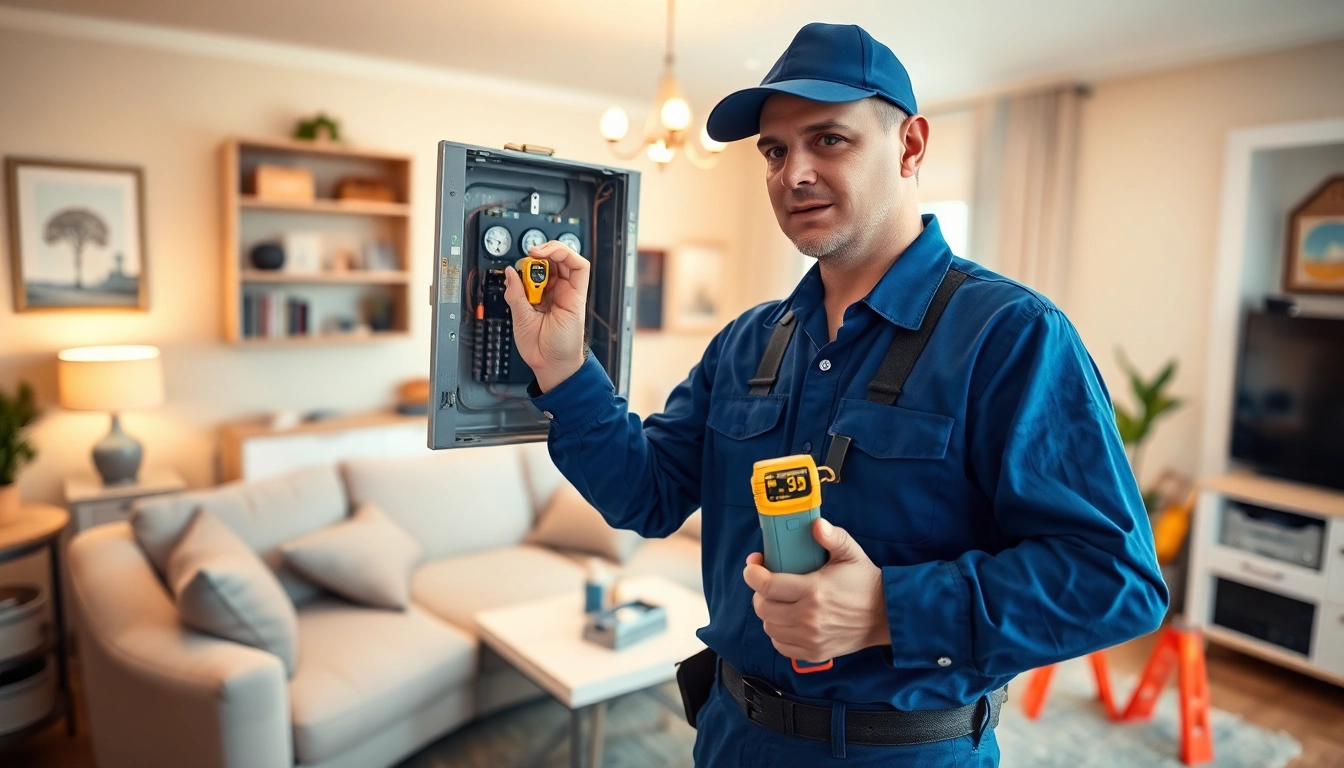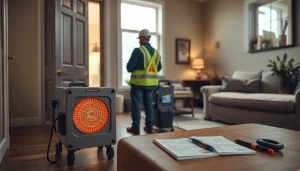Understanding the Importance of Electrical Home Inspection
What is Electrical Home Inspection?
An electrical home inspection is a comprehensive evaluation of a home’s electrical system, performed by a certified professional. This examination is designed to ensure that every aspect of the electrical wiring, outlets, panels, and other components meet current safety codes and function efficiently. The inspection typically includes a thorough assessment of the electrical panel, circuit breakers, grounding systems, and outlets to identify any possible hazards that may pose a risk to the occupants of the home.
Benefits of Regular Inspections
Conducting regular electrical home inspections brings multiple benefits, ensuring the safety and efficiency of the electrical system. Some key advantages include:
- Improved Safety: Early identification of problems such as faulty wiring or overloaded circuits can prevent electrical fires and other hazards.
- Enhanced Efficiency: A well-maintained electrical system functions more efficiently, potentially reducing energy bills.
- Increased Property Value: A home with a recent, thorough inspection can be more appealing to potential buyers, as it assures them of a safe living environment.
- Peace of Mind: Knowing that your electrical system has been professionally inspected provides homeowners with confidence in their safety.
Common Issues Revealed During Inspections
Electrical home inspections often reveal several common issues that may otherwise go unnoticed. These include:
- Old Wiring: Homes with outdated aluminum wiring or insufficiently rated copper wiring can lead to significant safety hazards.
- Circuit Overloads: Overloaded circuits can cause breakers to trip frequently, leading to inefficiency and increased fire risks.
- Poor Grounding: A lack of proper grounding can be dangerous, increasing the chance of electrical shock.
- Improperly Installed Fixtures: Light fixtures and electrical outlets that are not installed correctly can pose risks such as short circuits and electrical shocks.
Preparing for Your Electrical Home Inspection
Checklist of Things to Review
Before the inspector arrives, it’s beneficial to prepare. Here’s a concise checklist:
- Ensure clear access to the main electrical panel, outdoor service connections, and all areas where outlets and fixtures are installed.
- Verify that all electrical appliances are unplugged, where possible, to streamline the inspection.
- Identify and fix any known electrical problems prior to the inspection, if feasible.
- Review your home’s electrical documents, including previous inspection reports, upgrade receipts, or warranties.
How to Choose an Inspection Service
Selecting the right electrical inspection service is crucial for ensuring a thorough assessment. Consider the following steps:
- Verify Qualifications: Ensure that the inspector holds appropriate certifications and licenses relevant to electrical inspections.
- Experience Matters: Look for inspectors with extensive experience in residential electrical systems, particularly in homes similar to yours.
- Ask for References: Get recommendations from trusted sources or read reviews and testimonials from past clients.
- Insurance Coverage: Check that your chosen inspector has liability insurance to protect against any potential damages.
Preparing Your Home for The Inspector
Preparing your home effectively can enhance the inspection process. To this end, homeowners should:
- Clear clutter from areas around outlets and the electrical panel, allowing for unobstructed access.
- Remove furniture or obstacles that may block access to areas that need inspection, such as crawl spaces or attics.
- Check for any loose wires or visible damage around the home that might be flagged during the inspection.
- Document any previous electrical work, repairs, or modifications to provide a complete picture to the inspector.
What to Expect During an Electrical Home Inspection
Typical Procedures and Areas Covered
During an electrical home inspection, inspectors follow a set procedure that includes examining various components:
- Main Electrical Panel: Inspectors will check the condition and organization of the panel, verifying that breakers are appropriately rated.
- Outlets and Switches: Testing all accessible outlets and light switches ensures they are operational and safe, with no signs of wear or damage.
- Wiring: Inspectors will assess the state of the wiring throughout the home, looking for fraying, loose connections, or non-compliant installations.
- Smoke and Carbon Monoxide Detectors: These devices will be checked for proper installation and functionality, contributing to the overall safety of the home.
Possible Recommendations from Inspectors
Following the inspection, you may receive numerous recommendations from the inspector, which can help enhance the safety and efficiency of your home’s electrical system. These may include:
- Upgrading outdated wiring to meet current safety standards.
- Installing additional ground fault circuit interrupters (GFCIs) in areas where water exposure is likely.
- Rebalancing the electrical load by redistributing circuits effectively to prevent overloading.
- Encouraging routine maintenance checks to keep the system in optimal condition.
Understanding the Inspection Report
The electrical inspection report is a vital document that summarizes the findings of the inspection and the follow-up actions required.
The report generally includes:
- A List of Findings: A detailed account of all issues identified during the inspection, categorized by severity.
- Photographic Evidence: Many inspectors will include photos illustrating specific issues for greater clarity.
- Recommendations for Repair: Guidance on how to address the identified problems effectively.
- Compliance with Local Codes: An assessment of whether the electrical system adheres to all pertinent local and national codes.
Maintaining Your Home’s Electrical System Post-Inspection
Addressing Identified Issues
Once you have the results from your inspection, it’s crucial to take prompt action on any identified issues. This may involve:
- Engaging licensed electricians for repairs of significant problems noted in the report.
- Prioritizing repairs based on the severity and implications of each issue for safety and functionality.
- Keeping a timeline for repairs to ensure timely addressing of concerns, particularly those related to safety.
Preventative Measures to Avoid Future Problems
In addition to addressing issues, homeowners should implement preventative measures to maintain their electrical systems effectively:
- Regularly scheduled inspections, ideally every few years, can catch problems early before they escalate.
- Stay aware of voltage load limits and avoid overstressing the system by not plugging too many devices into a single outlet.
- Be vigilant regarding signs of wear, such as flickering lights or buzzing sounds, and address issues at the first indication.
When to Schedule Follow-Up Inspections
Follow-up inspections are important, especially after major repairs or upgrades. Homeowners should consider scheduling these when:
- Significant modifications have been made to the electrical system.
- New appliances that demand higher power have been added to the home.
- A previously flagged issue has been resolved, to confirm that the work done was effective and compliant.
Choosing the Right Professionals for Electrical Home Inspections
Qualities of a Good Electrical Inspector
Good electrical inspectors share certain qualities that set them apart:
- Thorough and Detailed: A quality inspector meticulously examines all relevant components of the system.
- Excellent Communication Skills: Successful inspectors can explain findings clearly and answer any questions homeowners may have.
- Up-to-Date Knowledge: They maintain current knowledge of changes to electrical codes and safety standards.
- Integrity: A reputable inspector will provide honest assessments and not recommend unnecessary repairs.
Comparison of Service Packages
When selecting an inspection service, evaluate the service packages offered. Compare:
- Scope of Inspection: Understand what is included in each package, such as whether the inspection covers both indoor and outdoor systems.
- Additional Services: Some companies offer follow-up assessments or remediation services as part of their packages.
- Pricing Structures: Review the overall cost per inspection and what financial flexibility they provide for additional services or consultations.
Reading Reviews and Getting Recommendations
Finding reliable reviews and recommendations is essential for selecting an electrical inspector. Consider these steps:
- Check online review platforms to gauge customer satisfaction ratings.
- Ask homeowners in your community for both positive and negative experiences they may have had with inspectors.
- Utilize social media groups or local forums for more personal recommendations.


